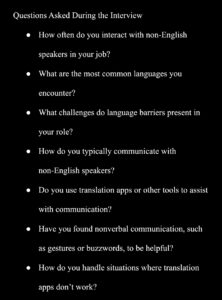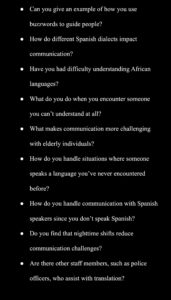Week 3: All about Interviews
Connor R -
Welcome back, everyone! I have received many more responses to my survey, but that`s not the focus of this blog. This week, I want to share insights from the four interviews I conducted with security guards at St. Joseph`s Hospital.


The first interview I had was with a security guard named Greg. Greg says that he usually deals with a few non-English speaking individuals per week, and he is able to get through it when he does, using translation apps. If that fails, he says that he uses nonverbal cues, gestures, and buzzwords to get by. For instance, if a lady comes in pregnant, Greg has an idea where she would like to go and can say words like ‘pregnant’ and ‘emergency’ to figure it out. He explained to me that he has trouble with all the many dialects of Spanish and how different words can have different meanings depending on context. In addition, he mainly has difficulties with African languages like Ethiopian and Nigerian. “Some come in, and I can`t understand them at all, but it’s a rarity,” Greg explained.
Next, I spoke with Chima, who speaks multiple languages, including French, German, and Igbo. Because of this, language barriers aren’t as big of an issue for him. He mentioned that he frequently interacts with people who don’t speak English fluently, such as Africans with limited English and Spanish speakers. Since he doesn’t speak Spanish, those interactions can be particularly challenging, but they use their phones to help him out. Chima explained that at night, it’s less of a problem because there is generally less interaction required and other personnel, like police officers who speak Spanish, are available. He finishes by saying. “Depends on how you want to communicate, but I can’t give out much info to them.”
The third interview I had was with a security guard named Charles. Charles only has one or two interactions with non-English speakers a week. It isn’t very challenging for him because he finds a way to communicate with them. What is difficult for him, though, are elders over 60, specifically old Hispanic people, because they are less likely to use phones and understand English. He explains, “It`s like imagine a 65-year-old Mexican dude who doesn`t know where he`s going. He can`t talk with me like a young person can, but I need to help him regardless. And if I can`t, I will find someone who can.”
The last security guard I spoke with, Mike, also only encounters a few language barrier situations each week, but he finds them to be particularly challenging. Mike noted that he interacts with non-English speakers around 3 to 4 times a week, with most being older individuals. He has problems with the African languages, but Spanish is the most common. Mike notes, “Kids are most likely to speak better with others and learn the language.”
Across all four interviews, some clear trends emerged: Spanish is the most common language barrier. African languages, particularly Ethiopian and Nigerian, are the most difficult to navigate. Older individuals tend to struggle more with communication, especially those who don’t use technology. In my next blog, I’ll compare these findings with additional survey data. Stay tuned for next week’s post, where I’ll dive into the final survey results and the four interviews requested in my survey!

Comments:
All viewpoints are welcome but profane, threatening, disrespectful, or harassing comments will not be tolerated and are subject to moderation up to, and including, full deletion.